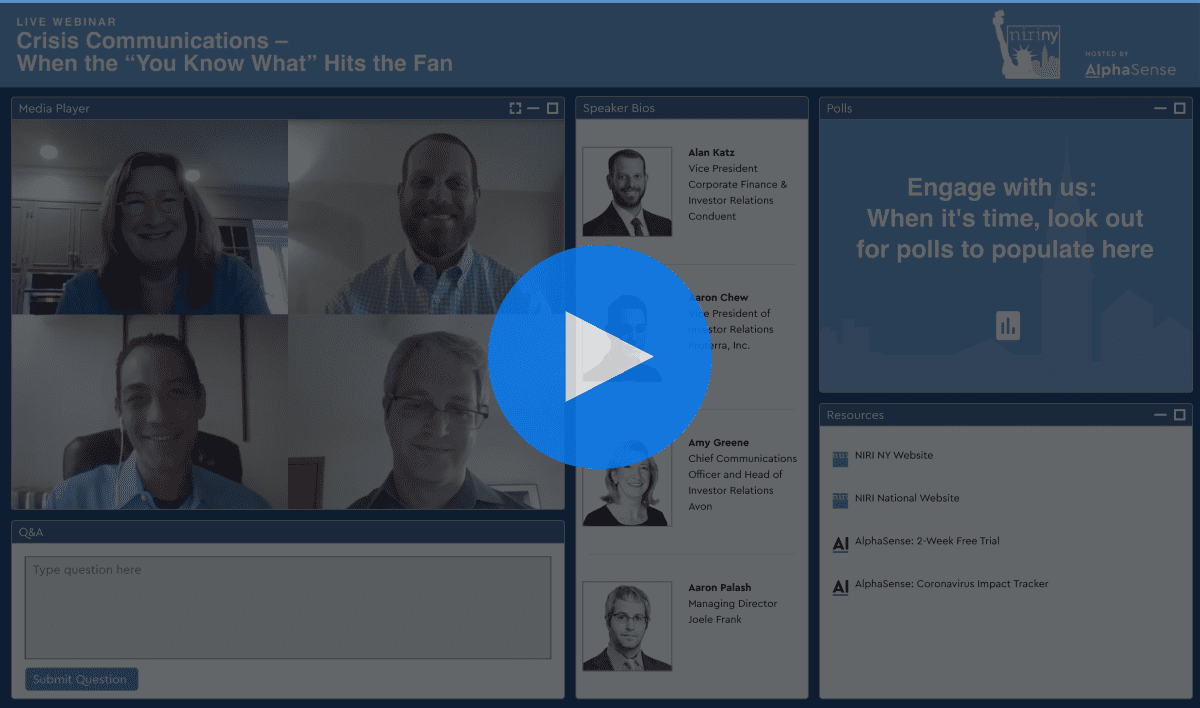NIRI NY partnered with AlphaSense to host a webcast panel discussion titled “Crisis Communications – When the You Know What Hits the Fan.”
Moderated by Alan Katz, Vice President Corporate Finance & Investor Relations, Conduent and Executive VP of Programs for the NIRI NY Chapter, the panel featured:
- Aaron Chew, Vice President of Investor Relations, Proterra, Inc. (Former IRO at Tesla)
- Amy Greene, Chief Communications Officer and Head of Investor Relations, Avon (Former SVP, Global Engagement at Herbalife)
- Aaron Palash, Managing Director, Joele Frank
The discussion focused on best practices, war stories and key insights from some of the most well-known and public crises in recent years, such as Herbalife, Tesla, PG&E and others. Panelists also discussed the global COVID-19 pandemic and how lessons learned from past experiences are applicable in the current environment.
Click here to watch a replay of the discussion:
Key takeaways include:
- During the nascent stages of the COVID-19 pandemic, companies are prioritizing internal communications as they learn to adapt to remote working environments, adjust their business structures and make organizational changes. Externally, they are attempting to prepare for upcoming issues and milestones – including earnings, annual meetings and liquidity issues – while still accounting for the uncertainty ahead.
- It’s important to maximize the amount of face time with investors during a crisis. Investor relations is all about credibility, and “going dark” could damage your reputation or personal relationships with both the buy- and sell-side. Even if you don’t have anything new to say, being upfront and admitting you don’t know or don’t have an answer is better than staying silent.
- There is a balance between communicating and over-communicating. IR’s mandate is to get the right information out in the market without going too far. When the facts are changing quickly, resist the urge of issuing a public statement too early and being forced to backtrack later.
- You can’t stick to the facts unless you have them. It’s important to have the right infrastructure in place within the organization to identify on the ground and funnel them up to the decision-makers quickly. Good lines of communication from the ground up can help increase the speed at which the issue is addressed.
- The investor relations function is most critical during times of crisis, as IROs are essentially playing two roles. On one hand, they are helping investors and analysts understand the situation and its impact on the business, while at the same time relaying the Street’s reaction to the Board, the legal team and the management team. Doing both well can help demonstrate value to your management team.
Visit our Resources Hub and discover our latest webinars including “The Future of Knowledge Work” and “Innovation in Market Intelligence.”
AlphaSense gives you access to full Earnings call transcripts and allows you to keep track of themes unfolding within your coverage universe through intelligent AI-powered search.
Sign up for a free trial to learn firsthand how AlphaSense enhances the workflows of over 50% of the S&P 500. Already have an account? Login here.




